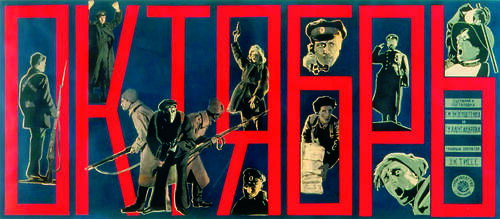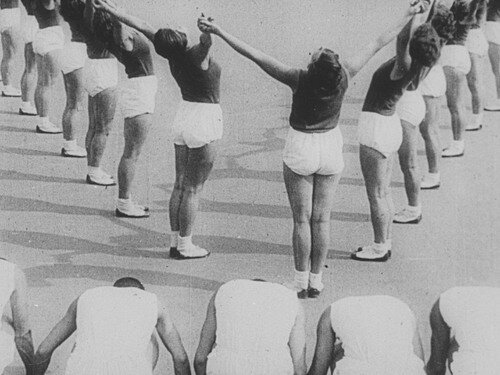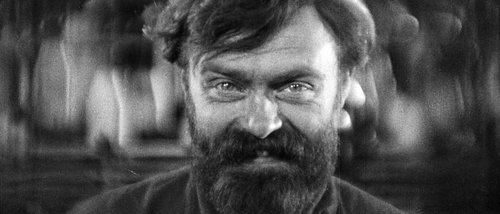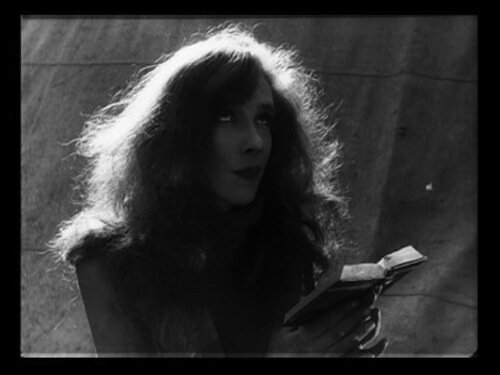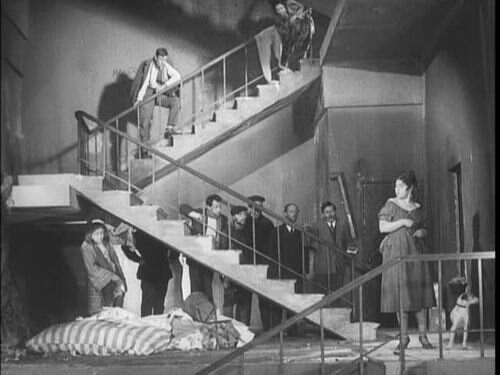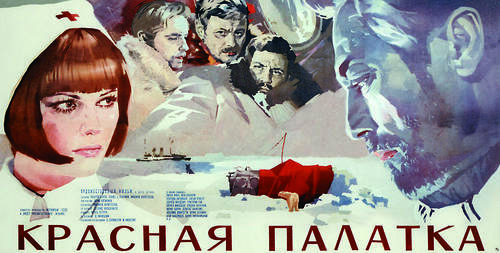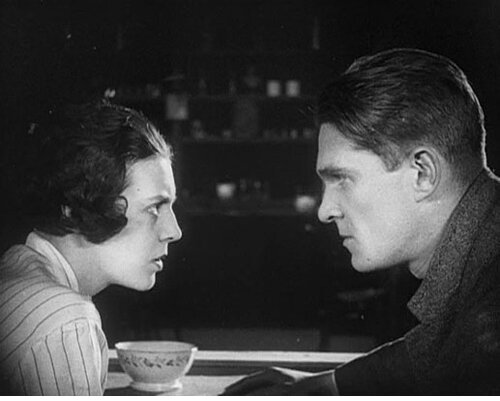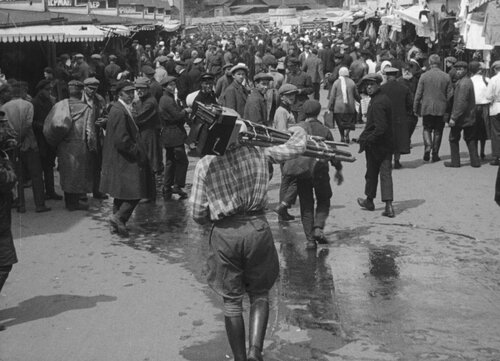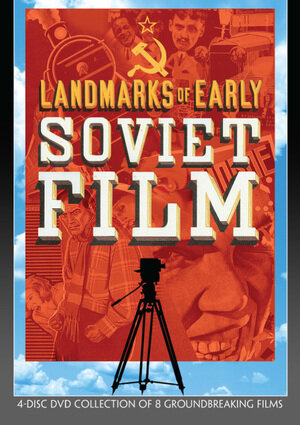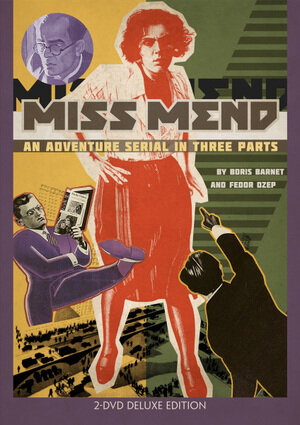SOVIET FILM LIST
During the 1920s, Soviet documentary and fiction films were financed by the State, and their fledgling directors, some barely out of their teens, converted their lives from theater, engineering, painting and journalism to the practice and theory of a revolutionary cinema devoted to showing the achievements and aspirations of the new Socialist society. Their problem was to captivate an enormous, culturally diverse, multi-lingual, semi-literate population in ways that would be emotionally compelling, yet ideologically clear. The proven ability of movies to achieve this difficult goal inspired Lenin's famous dictum, " For us, cinema is the most important art…," and their stunning innovations recharged world cinema.
BATTLESHIP POTEMKIN (PANZERKREUZER POTEMKIN) / OCTOBER (OKTJABR')
Sergei Eisenstein & Grigori Aleksandrov (USSR)
This deluxe 2-disc DVD set presents Sergei Eisenstein's immortal screen classics BATTLESHIP POTEMKIN and OCTOBER in previously unreleased and painstakingly restored versions featuring the original accompanying scores by Austrian-born composer Edmund Meisel. The ROM section includes a wide range of rare documents and detailed essays on the heavily influential creative partnership of "kindred spirits" Eisenstein and Meisel.
THE BOLSHEVIK TRILOGY - THREE FILMS BY VSEVOLOD PUDOVKIN
Vsevolod Pudovkin (USSR)
Pudovkin embarked on his narrative feature debut in 1926 with MOTHER, regarded by many as a masterpiece of the Russian silent era, and a showcase for Pudovkin’s emotive approach to editing. Pudovkin followed MOTHER’s tale of proletariat uprising with the Bolshevik-themed THE END OF ST. PETERSBURG and the Mongolia-set STORM OVER ASIA in 1927 and 1928 respectively, dazzling the world with a trio of masterful films centered around this tumultuous and revolutionary period in Russian history.
BY THE LAW (PO ZAKONU)
Lev Kulešov (USSR)
BY THE LAW (PO ZAKONU), Lev Kuleshov's legendary “constructivist western”, was one of the most popular films of its time and is now considered a masterpiece of Soviet Cinema. Adapted in 1926 from the Jack London story, “The Unexpected”, BY THE LAW tells the story of a group of prospectors in the Yukon who, after a gold strike and two murders, find themselves faced with an existential crisis, in the midst of horrific ice and darkness. Aleksandra Khokhlova, the main collaborator and partner of the director, portrays Edith, the unusual female lead.
DZIGA VERTOV: THE MAN WITH THE MOVIE CAMERA AND OTHER NEWLY-RESTORED WORKS
Dziga Vertov (USSR)
"I am an eye. A mechanical eye. I am the machine that reveals the world to you as only the machine can see it. I am now free of human immobility. I am in perpetual motion. I approach things, I move away from them. I slip under them, into them. I move toward the muzzle of a race horse. I move quickly through crowds, I advance ahead of the soldiers in an assault, I take off with airplanes, I fall on my back ad get up at the same time that the body falls and gets up. This is what I am, a machine that runs in chaotic maneuvers, recording movements one after the other, assembling them in a patchwork.”
ENTUZIAZM (SIMFONIJA DONBASSA)
Dziga Vertov (USSR)
Dziga Vertov's ENTUZIAZM is considered a masterpiece of early sound film and of Soviet avant-garde cinema. Dealing with the Five Year Plan of the late 1920s, it was praised by artists like Charlie Chaplin, was subsequently forgotten, and rediscovered by the avant-garde movement of the 1960s.
Fridrikh Ermler (USSR)
“If influence is the criterion for determining the significance of a film director,” writes Russian film scholar Denise J. Youngblood, “then Fridrikh Ermler is perhaps the most important director in Soviet film history.” Why he does not join the ranks of Eisenstein, Kuleshov, and Vertov as one of the great masters of Soviet filmmaking is unknown. Yet his legacy as an intricate craftsman of deceptively simple stories layered with psychological depth and technical proficiency lives on in his work.
LANDMARKS OF EARLY SOVIET FILM
Various Directors (USSR)
During the 1920s, Soviet documentary and fiction films were financed by the State, and their fledgling directors, some barely out of their teens, converted their lives from theater, engineering, painting and journalism to the practice and theory of a revolutionary cinema devoted to showing the achievements and aspirations of the new Socialist society.
MISS MEND
Fedor Ozep (USSR)
MISS MEND, an action-packed adventure serial in three feature-length episodes, was produced in Russia with the goal of rivaling, and possibly even surpassing, the most entertaining American movies of the 1920s. Instead of the avant-garde works of Sergei Eisenstein and Dziga Vertov, Russian audiences were enchanted by fast-moving American films starring serial queens like Pearl White, swashbuckling heroes like Douglas Fairbanks, and comedians from the Keystone Cops to Lloyd, Keaton and Chaplin.
SALT OF SVANETIA (DŹIM ŠVANTĖ (SOL' SVANETII) ) / NAIL IN THE BOOT (GVOZD' V SAPOGE)
Michail Kalatozov (USSR)
The Georgian-born filmmaker Michail Kalatozov (1903-1973) is best remembered for directing some of the most innovative and successful Soviet films of the 1950s and 1960s. This DVD edition presents digitally restored versions of two of his pioneering, silent era works, which were highly controversial in their time but now rank among the finest achievements in Soviet silent cinema.
A SIXTH PART OF THE WORLD (ŠESTAJA ČAST' MIRA) / THE ELEVENTH YEAR (ODINNADCATYJ)
Dziga Vertov (USSR)
The poetic travelogue A SIXTH PART OF THE WORLD and the “visual symphony” THE ELEVENTH YEAR mark the beginning of Dziga Vertov’s most creative period, which peaked in the canonical film MAN WITH THE MOVIE CAMERA. Vertov’s Kino-Eye aesthetic attempted “to give [back] the filmic to non-fiction film” as Barbara Wurm notes, as well as, in Vertov’s own words, “bring men closer to machines.”
THREE SONGS OF LENIN (TRI PESNI O LENINE)
Dziga Vertov (USSR)
Next to the classic MAN WITH A MOVIE CAMERA, Vertov’s "film poem" to the founder of the Soviet Union, THREE SONGS OF LENIN (TRI PESNI O LENINE), is the most universally acclaimed and enduringly popular of all his Dziga Vertov's films. This 2-disc set presents the earliest surviving versions of THREE SONGS OF LENIN, the 1938 silent and sound reissues of the film's original 1934 sound and 1935 silent releases, previously unavailable on video. The challenging production and exhibition circumstances surrounding this film, due in great part to the shifting politics within the Soviet Union, are meticulously recounted by historian Adelaide Heftberger in the bilingual booklet accompanying this DVD edition.

